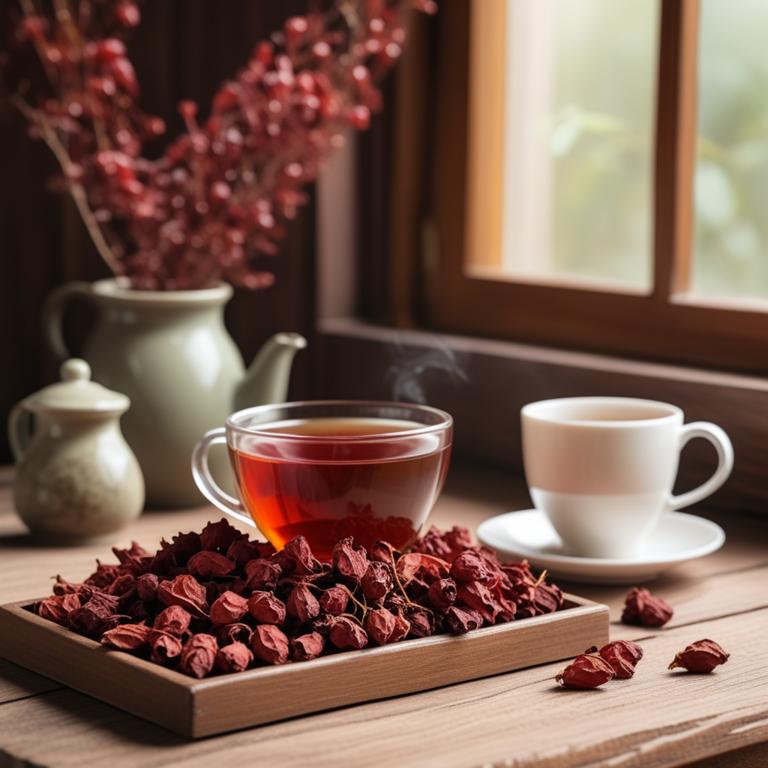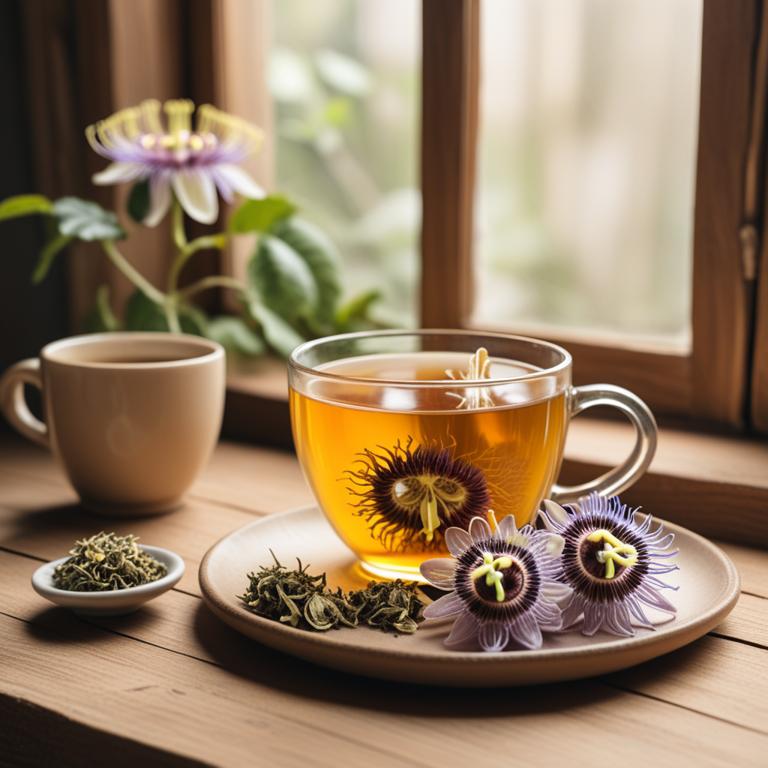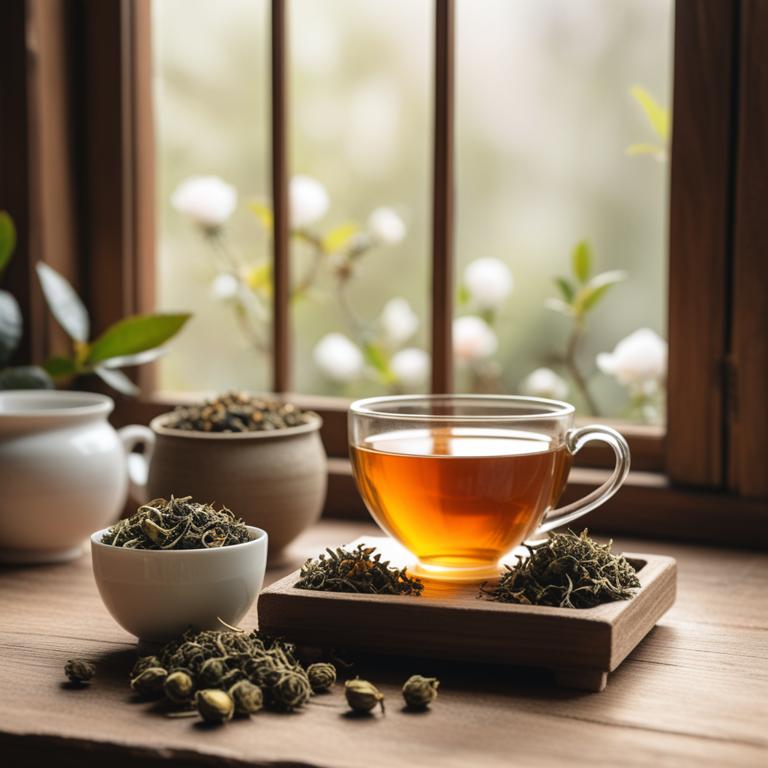11 Herbal Teas For Fatigue

Herbal teas are a great way to boost your energy and combat fatigue.
You see, these teas are made from plants that have been used for centuries to promote relaxation and reduce stress. Valeriana officinalis, also known as valerian root, is one of the most popular herbs used in herbal teas. It contains compounds that help calm your nervous system, making it easier to fall asleep and stay asleep. This means you'll wake up feeling more refreshed and revitalized. Ginkgo biloba is another herb that's often used in herbal teas. It's known for its ability to improve blood flow and reduce inflammation. When you're tired, your body's blood vessels may not be functioning as well as they should. Ginkgo biloba helps to widen these vessels, allowing more oxygen and nutrients to reach your cells.
This can give you a much-needed energy boost. Passiflora incarnata, or passionflower, is also used in herbal teas to help reduce anxiety and stress. When you're feeling fatigued, it's often because you're feeling overwhelmed or anxious. Passionflower helps to calm your mind and body, making it easier to relax and recharge. By reducing your stress levels, you'll be able to tackle your daily tasks with more energy and enthusiasm. By drinking herbal teas like these, you can experience a range of benefits. For one, you'll be able to sleep better and wake up feeling more refreshed. You'll also have more energy and be able to tackle your daily tasks with more enthusiasm. Additionally, you may find that your mood improves and you're less irritable.
And, because herbal teas are generally caffeine-free, you won't experience the jitters or crash that can come with drinking too much coffee.
- 1. Valeriana officinalis
- 2. Ginkgo biloba
- 3. Passiflora incarnata
- 4. Lavandula angustifolia
- 5. Zingiber officinale
- 6. Avena sativa
- 7. Melissa officinalis
- 8. Panax ginseng
- 9. Camellia sinensis
- 10. Glycyrrhiza glabra
- 11. Schisandra chinensis
1. Valeriana officinalis

Valeriana officinalis teas contains valerenic acid, valeranone, and isovaleric acid, which are biologically active constituents that contribute to its beneficial effects.
These compounds have a sedative and calming influence on the nervous system, reducing stress and anxiety, which are common causes of fatigue. Valerian root tea also contains alkaloids, such as valerianine and valeranin, that promote relaxation and help regulate sleep patterns. By reducing stress and promoting better sleep, Valeriana officinalis teas can help alleviate fatigue and improve overall well-being.
This herbal tea works by interacting with neurotransmitters, such as GABA, to regulate the body's natural sleep-wake cycle.
- Gather 1 cup of boiling water, 1 teaspoon of dried Valeriana officinalis root, and a tea infuser or a heat-resistant cup.
- Place the dried Valeriana officinalis root in the tea infuser or directly into the heat-resistant cup.
- Pour the boiling water over the root and let it steep for 5-7 minutes.
- Strain the tea into a cup using the tea infuser or a piece of cheesecloth to remove the root.
- Drink the tea as needed, ideally 1 cup 30 minutes before bedtime, to help with fatigue and improve sleep.
2. Ginkgo biloba

Ginkgo biloba teas contains bioactive constituents like flavonoids and terpenoids, which help to improve blood flow to the brain and muscles.
These compounds, particularly bilobalide and ginkgolides, have been shown to increase oxygen delivery and reduce inflammation in the body. As a result, ginkgo biloba teas can help to reduce fatigue and improve mental clarity. The increased blood flow also helps to reduce oxidative stress, which can contribute to feelings of tiredness and exhaustion.
By promoting healthy blood flow and reducing inflammation, ginkgo biloba teas can help to alleviate fatigue and leave you feeling more energized and focused.
- Gather 1 teaspoon of dried Ginkgo biloba leaves, 1 cup of boiling water, and a cup or mug.
- Measure 1 teaspoon of dried Ginkgo biloba leaves and add them to the cup or mug.
- Pour 1 cup of boiling water over the Ginkgo biloba leaves in the cup or mug.
- Let the mixture steep for 5-10 minutes. Strain the tea into another cup if desired.
- Drink the tea and enjoy. You can drink it 1-2 times a day for fatigue relief.
3. Passiflora incarnata

Passiflora incarnata teas contains flavonoids, alkaloids, and glycosides, which are active constituents that contribute to its potential benefits.
The flavonoids in Passiflora incarnata, such as kaempferol and quercetin, have antioxidant and anti-inflammatory properties that may help reduce oxidative stress and inflammation associated with fatigue. The alkaloids, including harmine and harmaline, can modulate the activity of neurotransmitters like serotonin and GABA, which play a role in regulating mood and energy levels. The glycosides, including passifloric acid, may also help reduce inflammation and promote relaxation, further contributing to a sense of calm and reduced fatigue.
By addressing underlying factors that contribute to fatigue, Passiflora incarnata teas may help alleviate this condition and promote a sense of well-being.
- Gather 1 cup of fresh or dried Passiflora incarnata leaves. Use 2-3 tablespoons for fresh leaves.
- Measure 1 cup of boiling water. Pour it over the leaves.
- Steep the mixture for 5-7 minutes. Strain the tea into a cup.
- Add honey or lemon to taste. Mix well.
- Drink 1-2 cups of tea per day for fatigue relief.
4. Lavandula angustifolia

Lavandula angustifolia teas contains linalool and linalyl acetate, two active constituents that help with fatigue.
These compounds have a calming effect on the nervous system, which can reduce stress and anxiety that often contribute to fatigue. Linalool also has sedative properties, promoting relaxation and improving sleep quality, which is essential for physical and mental recovery. Additionally, Lavandula angustifolia teas have antioxidant properties, helping to protect the body from oxidative stress and inflammation that can exacerbate fatigue.
By promoting relaxation, reducing stress, and protecting the body from damage, Lavandula angustifolia teas can help alleviate fatigue and improve overall well-being.
- Gather 1 cup of water and 1 tablespoon of dried Lavandula angustifolia flowers.
- Heat the water to 212°F (100°C) in a saucepan.
- Remove the water from heat and add the dried Lavandula angustifolia flowers.
- Let the mixture steep for 5-7 minutes, then strain the tea into a cup.
- Drink the tea warm or at room temperature, 1-2 times a day as needed.
5. Zingiber officinale

Zingiber officinale teas contains a compound called gingerol, which helps to reduce fatigue.
Gingerol has anti-inflammatory properties that soothe the digestive system and promote blood circulation. This improves the delivery of oxygen and nutrients to the muscles, reducing the feeling of exhaustion. Zingiber officinale teas also contains shogaol, a compound that stimulates the nervous system and increases alertness.
By enhancing circulation and stimulating the nervous system, Zingiber officinale teas can help to alleviate fatigue and promote a sense of well-being.
- Gather 1 teaspoon of dried Zingiber officinale root, 1 cup of boiling water, and a cup.
- Steep the Zingiber officinale root in the boiling water for 5-7 minutes.
- Strain the liquid into the cup using a strainer or cheesecloth.
- Add 1 tablespoon of honey (optional) to the tea and mix well.
- Drink the tea as needed to help relieve fatigue.
Zingiber Officinale Tea on Amazon
FGO Organic Ginger Tea, 100 Count, Eco-Conscious Tea Bags, Caffeine Free, Packaging May Vary (Pack of 1)
Disclaimer: We earn a commission if you click this link and make a purchase at no additional cost to you.
6. Avena sativa

Avena sativa teas contains a mix of bioactive constituents, including avenacosides, avenanthramides, and avenalin.
These compounds have anti-inflammatory and antioxidant properties, which help to reduce fatigue by fighting off free radicals and soothing inflamed tissues. Avena sativa also contains a significant amount of chromium, a mineral that helps to regulate blood sugar levels and improve insulin sensitivity, reducing fatigue caused by fluctuations in energy production. The avenanthramides in Avena sativa teas have been shown to increase nitric oxide production, improving blood flow and oxygen delivery to cells, which can help to alleviate fatigue.
By reducing inflammation, improving insulin sensitivity, and increasing blood flow, Avena sativa teas can help to combat fatigue and promote a sense of energy and vitality.
- Gather 1 cup of boiling water and 1 tablespoon of dried Avena sativa (oat straw) in a tea infuser or a heat-resistant cup.
- Pour the boiling water over the dried Avena sativa in the tea infuser or cup.
- Let it steep for 5-7 minutes, or according to package instructions.
- Strain the tea into a cup and discard the Avena sativa solids.
- Drink the tea as needed, ideally 1-2 cups a day, to help manage fatigue.
7. Melissa officinalis

Melissa officinalis teas contains rosmarinic acid, a powerful antioxidant that helps reduce fatigue by protecting cells from damage.
This tea also contains apigenin and luteolin, flavonoids that have anti-inflammatory properties and can help alleviate stress and anxiety, common causes of fatigue. The apigenin in Melissa officinalis tea has also been shown to have a sedative effect, promoting relaxation and reducing feelings of exhaustion. Additionally, the tea's high content of vitamin C and B vitamins helps to boost energy levels and support the body's natural defenses.
By consuming Melissa officinalis tea, you can potentially experience a reduction in fatigue and an improvement in overall energy and well-being.
- Gather 1 cup of boiling water and 1 tablespoon of dried Melissa officinalis leaves.
- Measure 1 teaspoon of dried Melissa officinalis leaves for every cup of boiling water. If you prefer a stronger tea, use more leaves.
- Steep the Melissa officinalis leaves in the boiling water for 5-10 minutes. Strain the tea to remove the leaves.
- Add honey or lemon to taste, if desired. Some people prefer their tea sweet or sour.
- Drink the tea 1-2 times a day to help with fatigue. You can store any leftover tea in the fridge for up to 24 hours.
8. Panax ginseng

Panax ginseng teas contains bioactive constituents like ginsenosides, which are responsible for its medicinal properties.
Ginsenosides have adaptogenic properties, allowing the body to adapt to stress and fatigue. The tea also contains eleutherosides, which help improve mental clarity and reduce fatigue by increasing blood flow to the brain. Ginsenosides also help regulate the body's energy metabolism, reducing fatigue and increasing endurance.
By improving mental clarity and reducing fatigue, Panax ginseng teas can help you feel more alert and focused.
- Gather 1 tablespoon of dried Panax ginseng root and 1 cup of water.
- Heat the water in a pot until it reaches 212°F (100°C).
- Add the dried Panax ginseng root to the heated water and let it steep for 5-7 minutes.
- Strain the mixture using a fine-mesh sieve or cheesecloth into a cup. Discard the solids.
- Drink the tea immediately and consume 1-2 cups per day as needed.
9. Camellia sinensis

Camellia sinensis teas contains several bioactive constituents that help alleviate fatigue.
L-theanine, an amino acid found in these teas, promotes relaxation and reduces stress levels, which can contribute to fatigue. Catechins, a group of antioxidants, help increase alertness and improve mental clarity by stimulating the brain's neurotransmitters. Theophylline, a xanthine alkaloid, also present in Camellia sinensis teas, increases the body's energy production by improving the flow of oxygen and nutrients to cells.
These bioactive compounds work together to help reduce fatigue and promote a sense of well-being.
- Measure 1 teaspoon of Camellia sinensis leaves (black, green, or oolong tea) and place it in a tea infuser or a small bowl.
- Heat 1 cup of water to 160-170°F (71-77°C) for green tea, 180-190°F (82-88°C) for black tea, or 150-160°F (65-71°C) for oolong tea.
- Pour the heated water over the tea leaves and let it steep for 1-3 minutes, depending on the tea type and your desired strength.
- Strain the tea into a cup and discard the tea leaves. You can add honey or lemon to taste if desired.
- Drink the Camellia sinensis tea hot or iced, and enjoy it 1-2 times a day to help with fatigue.
10. Glycyrrhiza glabra

Glycyrrhiza glabra teas contains active constituents like glycyrrhizin and flavonoids.
These compounds have anti-inflammatory and antioxidant properties, which help reduce fatigue. Glycyrrhizin also acts as an adaptogenic agent, helping the body adapt to stress and balancing its response to fatigue. Flavonoids, on the other hand, improve blood circulation and oxygen delivery to cells, providing energy and reducing fatigue.
By reducing inflammation and improving circulation, Glycyrrhiza glabra teas helps alleviate fatigue and promotes overall well-being.
- Gather 1 teaspoon of dried Glycyrrhiza glabra root and 1 cup of boiling water.
- Place the dried root in a tea infuser or a heat-resistant cup.
- Pour the boiling water over the root and let it steep for 5-7 minutes.
- Strain the tea into another cup and discard the root.
- Drink the tea 1-2 times a day, ideally before meals, to help alleviate fatigue.
11. Schisandra chinensis

Schisandra chinensis teas contains a combination of bioactive constituents, including schisandrins, schisantherin, and schisanhenol, that contribute to its potential benefits for fatigue.
These compounds have antioxidant and anti-inflammatory properties, which can help reduce oxidative stress and inflammation in the body. The antioxidants in Schisandra chinensis teas may also help protect against cellular damage and promote energy production. Additionally, the tea's adaptogenic properties can help regulate the body's response to stress and promote a sense of balance and well-being.
Schisandrins, in particular, have been shown to improve liver function and increase energy levels by promoting the production of ATP, the energy currency of the body.
- Gather 1 cup of boiling water and 1 tablespoon of Schisandra chinensis dried berries.
- Measure 1 teaspoon of dried Schisandra chinensis berries per 1 cup of water.
- Steep the berries in boiling water for 5-10 minutes.
- Strain the mixture into a cup using a tea strainer or cheesecloth.
- Drink the tea 1-2 times a day to help manage fatigue.